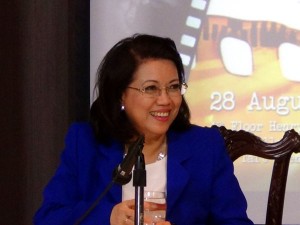MANILA, Philippines—Chief Justice Ma. Lourdes Sereno is encouraging lawyers who seem to know about, and have been discussing in “hushed tones,” the corrupt practices of “hoodlums in robes” to blow the whistle on these judges.
Sereno said the Supreme Court was open to discussing measures that would persuade lawyers to help stamp out corruption in the judiciary, which could include providing the whistle-blowing lawyers administrative amnesty and immunity from criminal suits.
Speaking at the Law Day celebration of the Philippine Bar Association (PBA) late Wednesday, Sereno said the legal profession could do a lot in reforming the bench as it represents “the single biggest group of people that actively interacts with the courts.”
“You have a big stake in making the judiciary a success story,” she told the gathering of lawyers.
She said lawyers were always the first to complain about corruption in the judiciary.
“It is common in lawyers’ circles to talk of judges engaged in below-the-table dealings, which talk has besmirched the reputation of the bench. You talk about law firms and lawyers with vaults in their offices that are ready to churn out hard cash for payoffs. Yet, you discuss these evils in hushed tones and through blind items,” the chief justice said.
Sereno noted that it was rare that a lawyer goes to the Supreme Court to file a case against corrupt judges.
She said she gets dozens of letters every month accusing a judge of corruption but more often than not they come from the losing parties in a case.
Still, she said she understood the risks for lawyers who tell on corrupt judges like losing the business of clients who may not support such decision or that their cases might be prejudiced.
Sereno urged the PBA to help weed out corrupt judges through its anticorruption campaigns.
“I hope you will start by naming judges who have initiated discussions or actually demanded bribes. The PBA may want to submit proposals on how the Supreme Court can encourage more whistle-blowers to come out,” she said.
Sereno offered to discuss possible measures such as “administrative amnesties in favor of lawyers who will report their past dealings with judges who have built a reputation for being available to the highest bidder.”
She said the high court may also agree not to disbar or administratively penalize these lawyers who come forward.
“As to their criminal liability, perhaps the Court can discuss with the Ombudsman the possibility of naming the whistle-blowers as state witnesses and giving them immunity,” she said.
But Sereno said she cannot start discussing these ideas with the other high court justices unless she sees a willingness on the part of the lawyers to cooperate in the fight against judicial corruption.
Sereno also assured the lawyers that if the cases filed are serious and supported by evidence, the justices of the Supreme Court “will see to it that the axe will fall on whoever deserves it, even if it falls close to us.”
“The image of the judiciary will probably temporarily suffer with the filing of these cases, but in the long run, a cleaning of the house will help lead to the gold standard status that we want for the judiciary,” she said.
